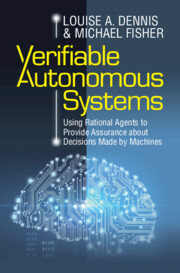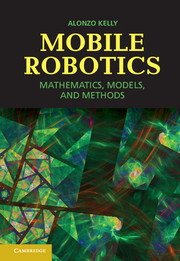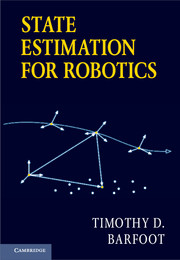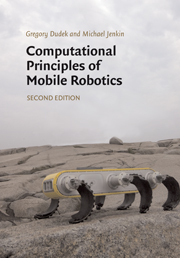Verifiable Autonomous Systems
Using Rational Agents to Provide Assurance about Decisions Made by Machines
$89.99 ( ) USD
- Authors:
- Louise A. Dennis, University of Manchester
- Michael Fisher, University of Manchester
- Date Published: May 2023
- availability: This ISBN is for an eBook version which is distributed on our behalf by a third party.
- format: Adobe eBook Reader
- isbn: 9781108620215
Find out more about Cambridge eBooks
$
89.99 USD
( )
Adobe eBook Reader
Other available formats:
Hardback
Looking for an examination copy?
This title is not currently available for examination. However, if you are interested in the title for your course we can consider offering an examination copy. To register your interest please contact [email protected] providing details of the course you are teaching.
-
How can we provide guarantees of behaviours for autonomous systems such as driverless cars? This tutorial text, for professionals, researchers and graduate students, explains how autonomous systems, from intelligent robots to driverless cars, can be programmed in ways that make them amenable to formal verification. The authors review specific definitions, applications and the unique future potential of autonomous systems, along with their impact on safer decisions and ethical behaviour. Topics discussed include the use of rational cognitive agent programming from the Beliefs-Desires-Intentions paradigm to control autonomous systems and the role model-checking in verifying the properties of this decision-making component. Several case studies concerning both the verification of autonomous systems and extensions to the framework beyond the model-checking of agent decision-makers are included, along with complete tutorials for the use of the freely-available verifiable cognitive agent toolkit Gwendolen, written in Java.
Read more- Examples and case studies throughout the book link to downloadable code, allowing users to experiment with the examples to see how they work at all levels of detail
- Case studies, drawn from several domains in collaboration with multiple research teams, help readers understand the applicability of techniques in a range of situations and to address a range of issues
- Contains a chapter on verifying ethical properties of systems along with more usual safety properties, allowing readers to understand how varying concerns about autonomous systems can be addressed
Customer reviews
Not yet reviewed
Be the first to review
Review was not posted due to profanity
×Product details
- Date Published: May 2023
- format: Adobe eBook Reader
- isbn: 9781108620215
- availability: This ISBN is for an eBook version which is distributed on our behalf by a third party.
Table of Contents
1. Introduction
Part I. Foundations:
2. Autonomous systems architectures
3. Agent decision maker
4. Formal agent verification
5. Verifying autonomous systems
6. Agent-based autonomous system verification
Part II. Applications:
7. Multi-agent auctions
8. Autonomous satellite control
9. Certification of unmanned air systems
10. Ethical decision making
Part III. Extensions:
11. Compositional verification – widening our view beyond the agent
12. Runtime verification – recognising abstraction violations
13. Utilising external model-checkers
Part IV. Concluding Remarks:
14. Verifiable autonomous systems
15. The future
Appendix A. Gwendolen documentation
Appendix B. AIL toolkit documentation
Appendix C. AJPF documentation
Bibliography
Index.
Sorry, this resource is locked
Please register or sign in to request access. If you are having problems accessing these resources please email [email protected]
Register Sign in» Proceed
You are now leaving the Cambridge University Press website. Your eBook purchase and download will be completed by our partner www.ebooks.com. Please see the permission section of the www.ebooks.com catalogue page for details of the print & copy limits on our eBooks.
Continue ×Are you sure you want to delete your account?
This cannot be undone.
Thank you for your feedback which will help us improve our service.
If you requested a response, we will make sure to get back to you shortly.
×





